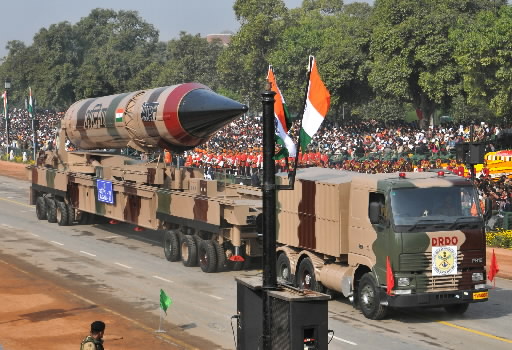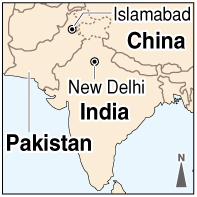Nuclear weapons can be eliminated: Chapter 2, Part 4
Apr. 19, 2009
Chapter 2: South Asia’s cold war
Part 4: Reality and the ideal
by Junichiro Hayashi, Staff Writer
India reverses stance on nuclear abolition, accelerates nuclear development
On January 26, a major thoroughfare through New Delhi was lined with crowds who had turned out to see a military parade commemorating Republic Day of India.
Shortly after 10 a.m. an Agni 3 missile, which is capable of carrying a nuclear warhead, appeared. The missile has a range of more than 3,000 kilometers, enough to reach several of China’s major cities. At the sight of the missile, Alok Pant, 35, a computer technician, exclaimed, “India is powerful. It makes me proud.”
In mid-February the Indian government announced its budget for fiscal year 2009. The defense budget is approximately 2.678 trillion, an increase of 34 percent over the previous year, the largest increase ever.
In Islamabad, the capital of neighboring Pakistan, Pervaiz Cheema, 68, a professor of defense policy at the National Defence College, held a newspaper clipping with a large headline about the increase in India’s defense budget. “India is powerful both economically and militarily,” he said. “They believe nuclear weapons will be a source of strength in their effort to become a superpower.”
Yet in the past India has called for the abolition of nuclear weapons.
In 1957, Jawaharlal Nehru, the first prime minister of independent India, gave a speech at Hiroshima Peace Memorial Park in which he called for a ban on atomic and hydrogen bombs. And in a 1988 address before the United Nations General Assembly, Prime Minister Rajiv Gandhi said, “Nuclear war will not mean the death of a hundred million people. Or even a billion. It will mean the extinction of four billion.” He called for the formulation of an action plan to abolish all nuclear weapons by 2010.
Immediately thereafter, however, India’s nuclear development program accelerated, reportedly at the direction of Mr. Gandhi himself. Why?
Rajiv Nayan, 38, a senior researcher at India’s Institute for Defence Studies and Analyses, said, “That’s because the world didn’t take up India’s call. There were two choices: to start a global trend toward nuclear disarmament or to explore the path of nuclear development. In the end, India chose nuclear development.”
China, India’s neighbor to the north, possessed nuclear weapons, and Pakistan, its neighbor to the west was secretly developing them. The creation of international mechanisms such as the Comprehensive Test Ban Treaty had stalled. Then in 1998 India conducted its first nuclear test in nearly 25 years.
At the New Delhi headquarters of the Bharatiya Janata Party (India People’s Party), Prakash Javadekar, 58, a member of the upper house of India’s Parliament, expressed his support for India’s actions. “It’s our right as a sovereign nation, isn’t it?” he said. His party was in power at the time of the test.
“We also seek peace, and I believe it would be better not to have an army. But that’s not realistic,” he said.
(Originally published on March 23, 2009)
To comment on this article, please click the link below. Comments will be moderated and posted in a timely fashion. Comments may also appear in the Chugoku Shimbun newspaper.









